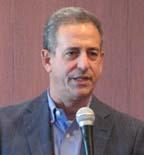Former Sen. Russ Feingold (D-Wis.) has not been idle since his defeat in the 2010 election, as he explained to about 100 people gathered to hear him at the Jewish Home and Care Center on Sept. 23.
He has been teaching law full-time at Marquette University. He has been writing a book, “While America Sleeps,” that is scheduled for publication in February. He has founded an organization called Progressives United that, he said, “is an attempt to fight the unlimited money in politics.” And he will “try to help President Obama get reelected next year.”
He also has been receiving recognition for his work. On Sept. 17, the Franklin and Eleanor Roosevelt Institute gave him its 2011 Franklin D. Roosevelt Four Freedoms Award.
Prior to his JHCC appearance, Feingold granted a short interview to Chronicle editor Leon Cohen. Selected and edited excepts from that conversation follow:
Even if you do nothing else politically from now on, you’ve made Wisconsin history [and] American history, you have also made Wisconsin and American Jewish history. I’m wondering if you could look back at what’s its been like and what its meant to you to be a Jewish American legislator in Madison and in Washington.
Well, I’ve just had a wonderful life. I hope to have a good chunk of it yet in the future. But I’ve had exactly the kind of life I was hoping to have.
One of the things I wanted to do in my life was to enter politics and be an honorable public servant. And to live in a state where people were tolerant and accepting and even encouraging about the fact that I was Jewish was one of the joys. I enjoyed talking about my background growing up as a Jew in a small town in Wisconsin [Janesville], what that was like.
I got to serve for 28 years in a row [10 in Madison in the state senate, 18 in Washington]. Maybe more than enough from one point of view. That doesn’t necessarily mean it’s all I’ve ever wanted to do. The pleasure for me now is, I get to try to do some other things I’m really enjoying. Life is good. And I’ve been fortunate with my health and my family and friends. I love this state, I love being back here full-time.
But this has also been an era of cultural war, in which religion has been a topic in American politics, such as in all the Republican presidential candidates debates going on. Has that ever come up in the course of your service in either Madison or Washington?
Not so much. But I can see what’s going on now. It’s not good for Americans to divide us based on religion. We should look for things that bring us together. I have enormous respect for all religions in our country. In fact, I enjoy learning about other religions and knowing people of other religions. But I’d like to see a continued effort to separate heavy religious emphasis on our political process, because in the end, it makes it hard for us to come together. I think it’s damaging to our political process to overly mix our secular world with our religious world.
You were a member of the Senate’s foreign relations committee. What has been your take and reaction to what’s been happening at the United Nations with the Palestinian Authority — and I understand that today P.A. President Mahmoud Abbas submitted the application for U.N. recognition of a Palestinian Arab state.
I’ve long believed there should be a Palestinian state. But I don’t understand how you can ask the United Nations for membership when you don’t even acknowledge the right to exist of the country that’s going to be your neighbor. That’s not the spirit of the United Nations, as I understand it’s supposed to be. So I agree with President Obama in saying no at this point. The P.A. needs to acknowledge Israel’s right to exist, then I think everything would easily flow from that.
I look at websites from the political right and left. In a time of recession and budget cutting, I see many on both sides beginning to think it is not really in this country’s best interest to be so supportive of Israel, and to provide the financial aid that we do, and so on. How would you respond to this?
They’re absolutely wrong. Israel is a tremendous ally for the United States. [Moreover,] if the people in the Middle East would accept Israel, [it] would be an enormous benefit to the countries in the Middle East. Its capacity to work on economic and other issues in the region in a cooperative way would be one of the real boosts for people that are suffering throughout the Middle East.
I can see a successful Israeli state and a successful Palestinian state becoming a dynamic center of business and progress throughout the world. That is my dream for that region.
Israel is a loyal ally of the United States at a time when we don’t as many loyal friends in that part of the world as we should. And it is a democracy. Instead of supporting somebody like [recently deposed Egyptian President Hosni] Mubarak or somebody else that’s just putting their boot down on the people of their country, Israel is a democracy, and so it is of great value to us in every way to continue our strong support for Israel.
I’m concerned about what I’ve been seeing in the “Arab Spring” [the spate of recent uprisings against Arab governments], and I’m wondering what your view is of what has been happening. Mubarak did maintain a peace treaty with Israel, and it looks like a lot of the Egyptian populace does not like it.
It’s a nervous time for Israel because it’s not clear what each of those situations will mean. But if we’re going to take the long-term view for Israel’s security, it can never depend on dictators in other countries to provide its security in the long term. If you just put your chips on one guy who can be driven out by a few protests, you’re making a big mistake. And we’ve made that mistake too many times.



